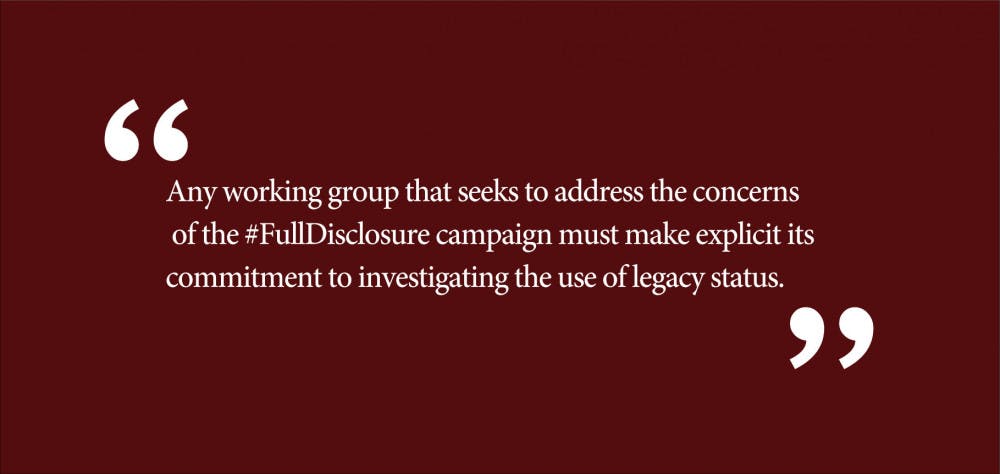In a recent community-wide email, Undergraduate Council of Students’ President Shanzé Tahir ’19 announced the creation of a University working group to “critically assess the ways in which Brown admissions can decrease barriers for first-gen and low-income students.” According to the email, the decision to form the working group was, at least in part, a response to the #FullDisclosure campaign, which, as The Herald previously reported, scrutinized the University’s legacy admission policies and pushed for greater transparency in how these policies function. But while all efforts to facilitate the conversation on accessibility and diversity in admission are welcome, we as a community must continue to press the University to move beyond its discriminatory practice of giving preference to legacy students. The University’s commitment to (and growing success in) expanding access for low-income and first-generation applicants and creating a more diverse class is laudable; but if it truly hopes to craft an admission policy that prioritizes equal access for underrepresented groups, it must begin working toward the abolition of legacy admission altogether. Any working group that seeks to address the concerns of the #FullDisclosure campaign must make explicit its commitment to investigating the use of legacy status and must not let the conversation on legacy admission get lost in the broader discourse.
There is a temptation to de-emphasize discussions of legacy admission in favor of some broader conversation about access, but any justification ultimately falls short. First, there is the claim that legacy status is only used as a tie-breaker among equally talented applicants, and therefore is of marginal importance in increasing access for low-income and first-generation students. This tie-breaker policy is justified by its proponents who believe that legacy students contribute to campus life in ways that other students do not. Some may also raise the point that we do not automatically become more socioeconomically diverse simply by abolishing legacy admission, and that this fixation on legacy status is disproportionate. When one digs deeper, neither of these arguments offers a compelling justification for sidelining the legacy debate. No matter how one slices it, abolishing legacy admission is a necessary condition for cultivating genuine socioeconomic diversity in the student body.
The most common refrain offered by the University in defense of its legacy admission policy is that it reserves consideration of legacy status for breaking ties between otherwise equally qualified applicants. This is unlikely. As I’ve previously written, legacy status at elite universities actually carries with it significant additional advantages. According to one Princeton study, legacy status was equal to an additional 160 points on the SAT. Another similar study in 2011 of approximately 30 top-ranking universities in the United States found that legacy status at the time increased an applicant’s chances of admission by 45 percent. Unless Brown is exceptional in its approach toward legacy applicants, it is, at the end of the day, creating space for legacy students at the expense of low-income and first-generation students because there are only a finite number of spaces. Trying to disentangle the University’s legacy admission policy from the broader discussion of equal access in admissions is impossible, and the University working group should resist this urge.
Yet even if one assumes that legacy status serves purely as a tie-breaker, there is still no clear reason why legacy applicants should be prioritized at all in the first place. Perhaps the most pervasive (but least compelling) defense offered by the University is that legacy applicants are capable of contributing exceptionally to the Brown community on account of their connection to the school. In his op-ed to The Herald last March, Dean of Admission Logan Powell wrote that “Many (legacy applicants) grew up immersed in the values of Brown” and could therefore serve as “mentors and guides to other students in navigating the University.” While this argument appears plausible on paper, one can never seem to pinpoint exactly how it operates in the real world. Are we expected to believe that alums put special effort into inculcating their children with “Brown values”? Do parents teach their children about the Ratty and the Open Curriculum? And should we accept the implication that through some transgenerational process of cultural osmosis, the children of alums are naturally more capable of acting as leaders and mentors? Is there empirical evidence to substantiate this argument, or are we meant to take this glib explanation at face value? The deeper one digs, the less this argument seems like a sincere defense of legacy admission and the more it seems like a pretext for maintaining the practice after the fact.
But regardless of whether the University is theoretically capable of simultaneously maintaining legacy admission and engaging in a broader effort to increase access for low-income and first-generation applicants, these two practices are actually irreconcilable. This contradictory approach — where the University extols the value of equitable access on the one hand and defends the seemingly arbitrary preference it gives to the children of its alums on the other — calls into question its level of commitment to a truly inclusive admission policy in the first place.
It goes without saying that abolishing legacy admission is not a panacea. Ending it will not, by itself, lead to an increase in socioeconomic diversity on campus. Truly crafting an admission policy that prioritizes merit and equal access requires a constellation of interacting policies that the University working group will, hopefully, have an opportunity to flesh out. But ending the consideration of legacy status in admission should be among them.
Connor Cardoso ’19 can be reached at connor_cardoso@brown.edu. Please send responses to this opinion to letters@browndailyherald.com and op-eds to opinions@browndailyherald.com.





